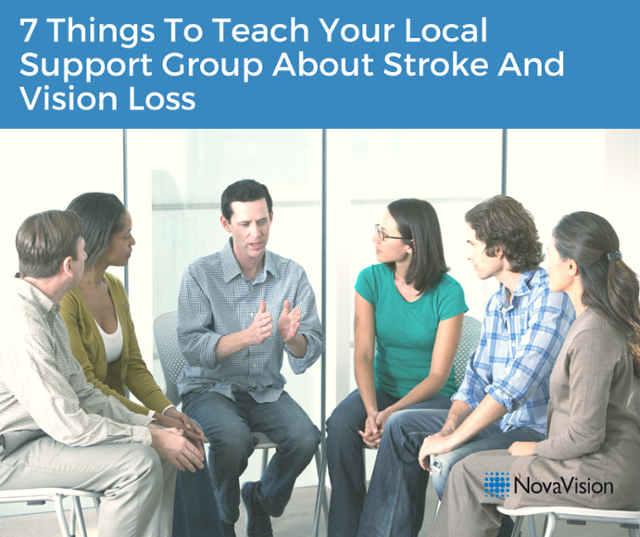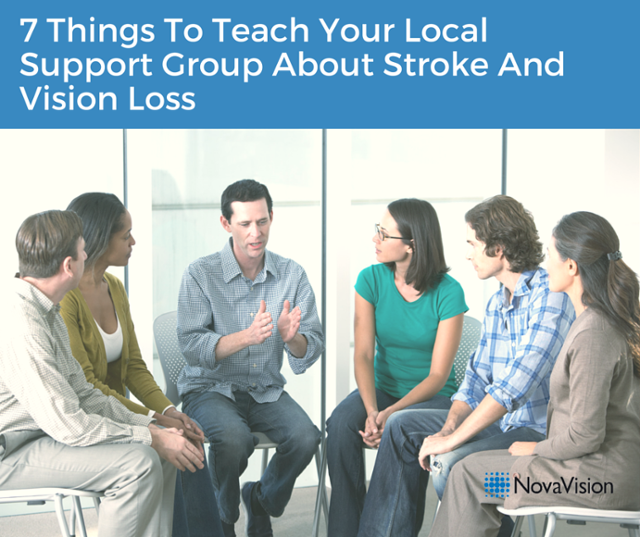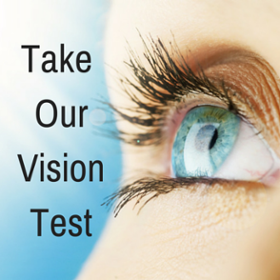
You may have seen our previous blogs highlighting important facts about stroke and vision loss but weren’t sure if this information had a place in your local support group. Vision loss as a result of stroke or other brain injury has been a largely unaddressed issue, with patients often returning home without diagnosis or help. The topic has recently been gaining more attention and support groups can serve as a great forum to educate patients on the issue and available therapies. NovaVision can provide the tools to help support groups do this.
If you are a support group leader or if you are currently an active member in your local stroke support group, here are 7 things you should be discussing when it comes to stroke and vision loss:
1. It’s More Common Than You May Think.
One of the most important pieces of information surrounding stroke and vision loss is just how often one leads to the other. Up to 66% of all stroke survivors will experience some changes to their vision after suffering from a stroke. Typically, the loss of vision is a direct result of damage done to a certain part of the brain, this is known as Neurological Vision Loss. The type of Neurological Vision Loss that is most common after a stroke is visual field loss and it is estimated that approximately 20% of survivors will experience this type of permanent visual field deficit. To be more specific, the different types of visual field loss include Hemianopia, Quadrantanopia and Scotoma.
2. A Medical Professional May Not Notice Before You Do.
As we have mentioned in the past, the visual problems that follow a stroke (or traumatic brain injury) can often times be hidden. All too often, patients are discharged from care before they have a chance to even notice these possibly severe complications with their vision, which is exactly why it’s so important to keep support group members informed and aware. Although the specific type of vision loss caused by damage to the brain has been the focus of increasing attention over the last decade, many facilities still don’t test for it as a part of their typical care. One of the major reason visual deficits go undetected is because life threatening conditions are being treated first. Luckily, patients can test their vision in the comfort of their own home using online visual field screening tests. If you aren’t sure if taking an Online Vision Test would be right for you, read this blog for what exactly you can expect.
3. Neurological Vision Loss CAN be Recovered.
And it’s all because of a concept called Neuroplasticity. The idea behind Neuroplasticity is that your brain will continue to build new neural pathways and heal as long as it is challenged by new information in a stimulating environment. If harnessed and carefully guided, plasticity can enhance and speed up recovery and restore lost function. Although this approach doesn’t heal the damaged parts of the brain, it does allow for recovery by essentially reprogramming the survivor’s brain.
There have been years of research and studies that support the science behind therapies that utilize Neuroplasticity, you can see some of ours here.
4. Your vision can significantly affect the rest of your recovery
Another important reason that your local stroke support group should be talking about vision loss after stroke is because it has such a significant effect on other parts of your recovery. Your vision is a critical sense and poor vision can seriously hinder both physical and verbal recovery which is often times a stroke survivor’s primary focus.
Since your vision has a direct impact on your ability to read, speech recovery can be much more difficult. Impaired visual field loss affecting your reading ability can also be a serious safety risk in regards to driving. Your vision is also directly related to your balance. If your visual field loss is making it more difficult to balance correctly, learning to walk again may be nearly impossible. Even if there are other functions you may want to focus on recovering before your vision, it’s important to consider how important your vision is to recovery as a whole.
5. There are Proven Treatments Available for the Right Candidates
That’s right, therapies such as NeuroEyeCoach focus on compensating the lost vision and often times lead to meaningful improvement in visual search performance. After completing the therapy, many patients see improvements in navigation skills and object finding. It also increases the efficiency of the eye movement and re-trains patients’ ability to make the most of their remaining vision.
Vision Restoration Therapy takes recovery a step further, with studies showing approximateluy 70% of patients showing notable improvements in their vision upon completing the program. This therapy is designed to strengthen the visual information processing of residual neuronal structures that have survived following acute lesions of the nervous system.
6. It’s Ok To Find a New Physician
Sometimes when a patient is ready to move forward with exploring therapy options like VRT, their current Physician may not be in a position to prescribe the therapy or they simply may not yet be aware of the scientific research and results associated. Not only is it perfectly normal to look for a new Physician, but we’re happy to help a patient or any fellow support group members through the sometimes challenging process.
If a support group member doesn’t have a physician or would like to seek a second opinion, we are happy to find a Physician who is familiar with VRT and comfortable prescribing the therapy to the right candidates. Support group members can search for a qualified prescribing Physician in their area by utilizing our user-friendly physician’s directory or contacting us directly at any time.
7. There is a community of people who can help.
As you know from being involved in a local stroke support group, survivors make up a tight knit community of people who can not only offer you guidance but truly relate to what you have already gone through as well as what lies ahead.
There are people who have also suffered from vision loss following a stroke and not only have they learned to compensate but many have made significant recoveries. Take some time to meet Carole, Dan, Anette, and the countless other survivors who have successfully recovered their vision.
We hope this information is valuable to both you and your local stroke support group. Sharing knowledge and similar experiences is essential to recovery. If you’d like even more information to bring to your support group, be sure to follow our blog for weekly updates and new resources.



